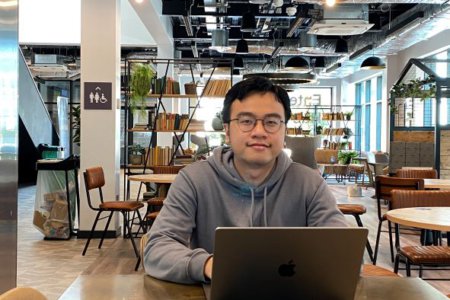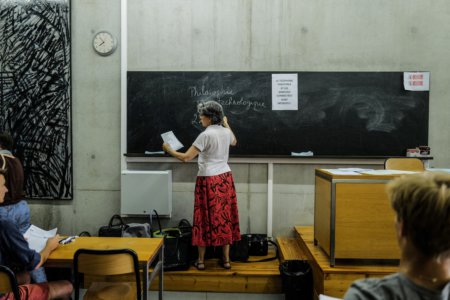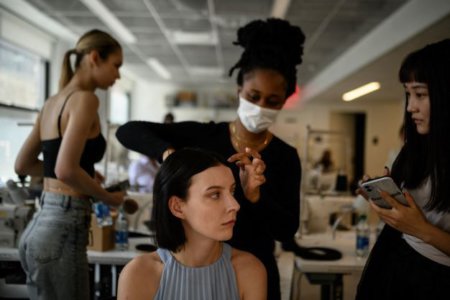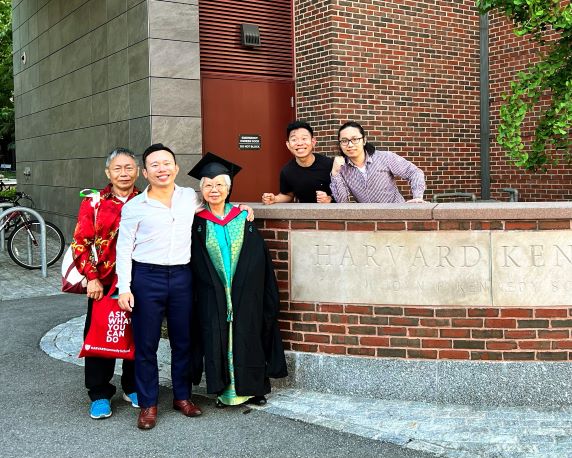
Malaysian graduate Andrew Loh is passionate about politics — so much so that he studied it for his bachelor’s and master’s, advised governments locally and abroad, and even organised nationwide community projects that have played a role in shaping his country’s future.
And he’s hungry to achieve more. The 35-year-old recently graduated from not one, but two top universities in the world — Harvard University and Stanford University — after successfully enrolling in a dual degree programme.
In a LinkedIn post, Loh claims to be the first Malaysian to graduate with a dual degree from Harvard Kennedy School and the Stanford Graduate School of Business, and the 11th Malaysian to graduate with a Stanford MBA.
We caught up with him to find out more about his experience with studying at two of the world’s top universities, along with his future aspirations:
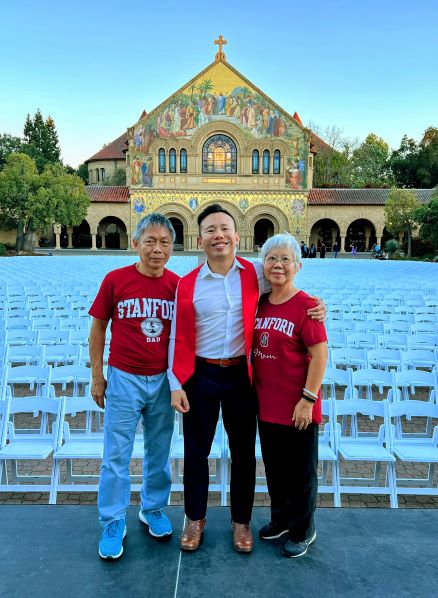
Loh (centre) with his parents during his graduation ceremony at Stanford University. Source: Andrew Loh
Congratulations on graduating from Harvard and Stanford! Why did you choose to pursue a dual degree programme at Harvard Kennedy School and Stanford Business School?
When I worked as a consultant across Africa, Asia and Europe, I was struck by the state’s importance in creating change. I was interested in expanding how I could create change as an individual and a future leader via different levers — via the public, private and non-profit sectors.
That’s why I chose Harvard and Stanford. I wanted to sharpen my understanding on the state’s power to create change at Harvard and understand the power of the private sector at Stanford.
How did you apply for the dual degree programme?
I applied for both degrees — the Master of Public Administration at Harvard and the MBA at Stanford — separately.
When I got accepted to both, I spoke to the universities to sequence my dual degrees so that I only needed three years to study at both universities. You can choose whichever university you’d like to start with — for example, I spent my first year at one university, the second year at another and split my third year at both universities.
What was it like for a Master of Public Administration at Harvard Kennedy School?
At HKS, I continued my love for both my country and civic action. During the COVID-19 pandemic, I used lessons from my HKS classes to co-found an online platform that empowered ordinary Malaysians to channel aid to vulnerable communities via non-governmental organisations (NGOs). We reached more than 300,000 users and became Malaysia’s default hashtag for COVID-19 civic initiatives. I learnt that action is contagious — action begets action from others. In fact, our movement inspired the replication of similar platforms in Germany, Austria, and India.
At HKS we are lucky to learn from the best professors in the world. My most memorable professors, however, cared for me as a person, not just as a student. Professor Pinar Dogan taught us economics at HKS. When COVID-19 hit, we were despondent and isolated (imagine going from meeting your classmates every day to being stuck in your dorm room). Dogan organised a Zoom get-together for her students with a surprise – she prepared a trivia competition about us! Dogan had spent days Googling interesting facts about each of us – eg how many languages does X speak? Who amongst you is a prize-winning poet?
And what a surprise it was. We were so touched – we grew to know so much more about the personal lives and achievements of our classmates. By shining a spotlight on us individually, Dogan went beyond her role as a professor. Dogan built a community during COVID-19 and brought us together. We are so lucky.
Ultimately, Harvard is a choose-your-own-adventure type of experience. There are so many opportunities that one has to prioritise and be intentional with how to spend one’s time. In your free two-hour slot, do you (1) do homework, (2) attend this talk that the President of X country is giving, (3) go to your professor’s office hours, (4) deepen friendships, (5) go to the gym? For me, I prioritised making lifelong friends and building community. Some of my favourite memories at Harvard are just walking along the Charles River with a classmate, or just hanging out at the HKS cafeteria – making space to make new friends and deepen relationships with old friends.
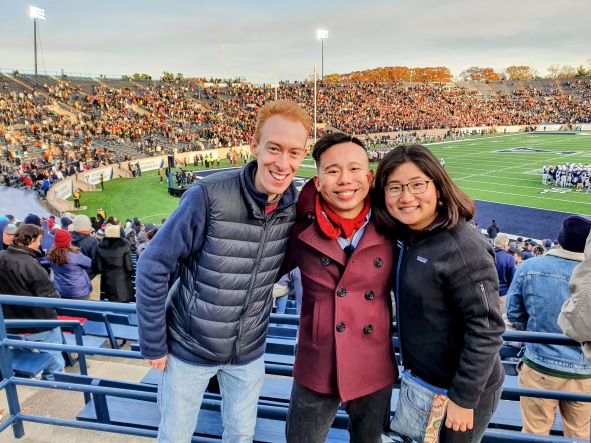
Loh (centre) with his friends at a Harvard-Yale game. Source: Andrew Loh
What was studying at Stanford University like?
I love, love, love Stanford — I love the school. It is beauty and magic.
At the Stanford Graduate School of Business (GSB), my class is very, very small. This is intentional. The GSB differentiates itself from other business schools by the type of community it builds. Our program is structured uniquely so that students can get to know their classmates in deep and meaningful ways.
One of these platforms is a program called TALK – every week, two students tell their life stories to the full class. Many of us go deep. Many bare our souls. Some cry. It is one of my favourite GSB traditions because it brings closeness, intimacy, and meaning. I get to know my classmates in a way few others do – what beauty, what strength. We as a class are stronger because of it.
Not only is our MBA program structured to build community, but GSB students prioritise this goal themselves. I started Stanford during COVID-19, and because of pandemic restrictions, we had to be creative in crafting special platforms to build our own community.
Led by Summer Hu, GSB ’22, we held a concert in the courtyard of our student residences. Imagine this — while socially distanced, our class gathered together for the first time in person, it was an incredibly emotional moment. Just for a moment, we suspended time and reveled in the beauty and talent of our classmates’ performances. For a moment we were one – in the courtyard, along the balconies, in our dorms, over zoom.
Accompanied by Hu, I sang the song “Hallelujah” at this concert – my friends told me it brought tears to their eyes. I’m very proud that this is featured on Stanford GSB’s Instagram! This is Stanford GSB – your classmates are individuals who care deeply about people and culture and act to build community.
This is why I love Stanford. Beauty, connection, closeness.
What were the most memorable classes throughout your dual degree programme? Why?
Stanford’s classes are superb. There’s this class called Touchy Feely (formally known as Interpersonal Dynamics) — it’s probably the most famous Stanford Business School class in history. GSB alumni consistently refer to it as the most helpful class for life after school. It is a space where students can give and get honest feedback about how they come across to others, grow in self-awareness, and use tactics like connection, confrontation, and empathy to become better leaders.
Another amazing class is Managing Growing Enterprises (MGE). In this class, you are put into specific business dilemmas where there are no easy solutions.
Assume you are a CEO and you have to fire someone. How would you do this? What if they cry, get mad, or threaten to sue you? What if your two most trusted and effective lieutenants just don’t get along, and force you to choose between them? How do you interview people? How do you hire a COO between three great candidates? We roleplay these scenarios in class – because, as my professors say, “it’s better to make mistakes in class than in real life.” To me, this is a crash course for hard decisions that we will face as future leaders. Really invaluable insights – I have a whole bunch of notes in my notebook that I will keep forever.
Lastly, there’s this class called Humour: Serious Business. This class has challenged me to use humour as a tool to gain influence in both my personal and professional life. By showing my true self at work via humour and authencitity, I’m giving licence for others to do the same. We don’t have to always walk on eggshells. Humour builds trust and breaks down conflict. Before Stanford, I was wary of using levity at work (I was warned not to do so, especially in environments where how much influence you had depended on how much grey hair you had). This class changed my mind. Now, I understand the power of bringing one’s full self to work, jokes and all.
Tell us how your journey as an international student began.
I knew I wanted to study in the States because I could apply undecided, and I wouldn’t have to determine what I wanted to major in until the second year of college.
If I had chosen to study in Malaysia or the UK, I would have to choose a specific major — for example, pursuing Philosophy, Politics and Economics at Oxford University or Law at Cambridge University.
So the US’ flexibility appealed to me. I didn’t know what I wanted to do in life — and the only way of really knowing was to experience it for myself and take some classes.
Why did you decide to study the Bachelor of Arts, Political Science; Islamic Studies at Swarthmore College? What was it like studying there?
Politics was what interested me at Swarthmore College — a small liberal arts school in Philadelphia. After taking a few classes, I was like, “Oh, this is actually really cool and interesting”. So, not only did I major in Political Science, but I also minored in Islamic Studies which included classes on Islam, Arabic and Arab culture.
Swarthmore was great — not just for its academics. The thing about American colleges is that they have a very comprehensive approach to tertiary education.
I had many opportunities I could exploit in Swarthmore that I wouldn’t have been able to do in Malaysia. I was in many different extracurricular activities — I was in the debate team, choir, a Jewish a cappella group and an Arab musical ensemble where I performed with an Arabic superstar.
In addition to these activities, what really enriched me was the friendships I made — for example living in dorms meant that I could have late-night conversations with new friends.
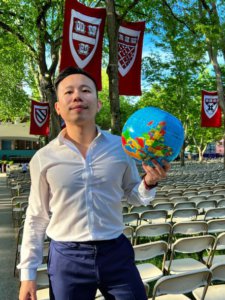
“In the long run, I hope to return to Malaysia to serve in a leadership role (eg: Election Commission Chairman; Prime Minister) — where I hope to to inspire my fellow citizens to create positive change.” Source: Andrew Loh
How has the education at Swarthmore College made you who you are today?
I learned to manage time — it’s the most precious resource you can do as a student.
So you know that joke, right? If you’re a student, choose two: (1) study, (2) make friends and be active in extracurricular activities, (3) sleep.
For me, I focused on sleeping, doing well in school and being present enough to enjoy time with friends — rather than being involved in 110 different activities.
This practice carried on in life as well. After college, I worked to advise governments across Africa, Europe and Asia — most recently with the Tony Blair Institute. I believe that the most important thing leaders — whether it’s prime ministers or presidents — do is manage their time.
Your time is limited to 24 hours per day — you can either spend it on 100 different things that may not materialise or ruthlessly prioritise two or three really important outcomes that may change your life.
You’ve worked in numerous countries throughout your career. What was it like living in different countries?
I’ve always had this wanderlust. I wanted to see the world — and having an international career was perfect. I’m always excited to learn about people, languages, cultures and communities.
My job was impactful and meaningful. For example, in Sierra Leone, we helped the government implement a post-Ebola recovery programme — which was deeply meaningful. I worked alongside local heroes who were crucial in fighting Ebola – I was inspired and touched by their courage and sacrifice.
Can you tell us about the cultural similarities/differences between these countries? For instance, was there anything that came as a culture shock to you?
Regarding culture shock, I think coming from Malaysia — a multiracial country — helped. I was exposed to many cultures back home, and this openness and this openness helped me adapt in my international career.
One thing I love doing when I enter a new country is learning local languages and histories. First, this is good in itself. I am excited by the beauty and diversity of human existence – languages and stories are two ways in which I find this. Second, this is good for its consequences. People have different reactions and feelings when they see you care about their culture. In my experience, my attitude was interpreted as deep respect and appreciation – which helped me build relationships that ultimately enhanced my professional impact.
What are your plans now that you’ve completed both of your master’s?
I’m not sure. What school has taught me is that you don’t need to rush — just take your time and reflect. In the long run, I hope to return to Malaysia to serve in a leadership role (eg: election commission chairman; prime minister) — where I hope to apply all my learnings to inspire my fellow citizens to create positive change.








